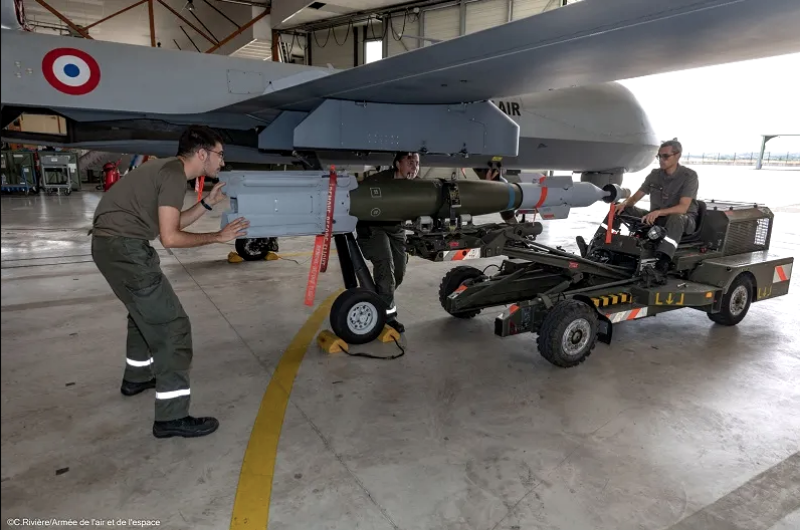France has successfully completed trials of a significant software upgrade to its fleet of General Atomics Reaper Block 5 Unmanned Aerial Vehicles (UAVs), marking a crucial milestone in expanding the country’s military capabilities. This software upgrade enables the Reaper UAVs to conduct operations from French bases and fly over French territory, bolstering its surveillance and reconnaissance capabilities.
The upgrade, designated as the v2408 software version, has been meticulously tested by the nation’s military aviation expertise center and the DGA Flight Test Center of Expertise and Test. These trials were conducted with the steadfast support of the French Air and Space Force. The software upgrade ushers in the integration of advanced armament and communications-intelligence capabilities, signifying a leap forward in the UAV’s versatility and strategic applications.
During the test flights, the Reaper UAVs were accompanied by two Dassault Rafale multirole fighter jets, showcasing the collaborative nature of France’s military endeavors. The successful outcome of the trials paves the way for the planned upgrade of all French Reaper Block 5 aircraft to the v2408 software by the close of 2023. This transformational enhancement not only empowers the Reaper UAVs to operate over French territory but also facilitates training exercises within the country with minimized restrictions. The journey to this accomplishment has not been without challenges.
The first French Block 5 Reaper was delivered in January 2020, yet its operational status was delayed due to clearance issues from the defense procurement agency DGA. The inaugural flight of a Block 5 Reaper took place in March, followed by the commencement of operational missions in May 2021, showcasing the dedication of French military personnel in overcoming obstacles.

On June 15 and 16, 2023, the Reaper drones from the Cognac airbase successfully carried out their first laser-guided GBU-12 inert bomb firings in France at the Captieux firing range.(Photo by French Ministry of Defense)
The strategic importance of these enhanced capabilities is underscored by France’s deployment of armed Reapers to regions such as Niger. However, this operational significance has not been devoid of setbacks. In May of the preceding year, a Block 1 variant of the Reaper experienced a crash while preparing to land at Diori Hamani International Airport in Niamey. Additionally, a Reaper crashed in Niger five years prior following operations in Mali, highlighting the inherent risks associated with such missions.
Notably, in August 2021, France’s Ministry of Armed Forces disclosed that a French Block 5 Reaper successfully dropped a GBU-12 laser-guided bomb in the Sahel region as part of Operation Barkhane, demonstrating the tangible impact of these advanced capabilities in real-world scenarios. The culmination of these efforts signifies a pivotal moment in France’s defense landscape, enhancing its unmanned aerial capabilities and bolstering its national security posture.
The General Atomics MQ-9 Reaper is an unmanned aerial vehicle (UAV) capable of remotely controlled or autonomous flight operations, developed by General Atomics Aeronautical Systems (GA-ASI) primarily for the United States Air Force (USAF). The MQ-9 and other UAVs are referred to as Remotely Piloted Vehicles/Aircraft (RPV/RPA) by the USAF to indicate ground control by humans. On 31 May 2013, French Defense Minister Jean-Yves Le Drian confirmed the order of two MQ-9 Reapers, to be delivered by the end of 2013. It was chosen to replace the EADS Harfang and was picked over the Israeli Heron TP.
On 27 June 2013, the U.S. Defense Security Cooperation Agency notified Congress of a possible Foreign Military Sale to France for 16 unarmed MQ-9s, associated equipment, ground control hardware, and support, worth up to $1.5 billion total. On 26 August 2013, France and the US Department of Defense concluded the deal for 16 Reapers and 8 ground control stations, with French operators beginning training.
Source: Military Leak

